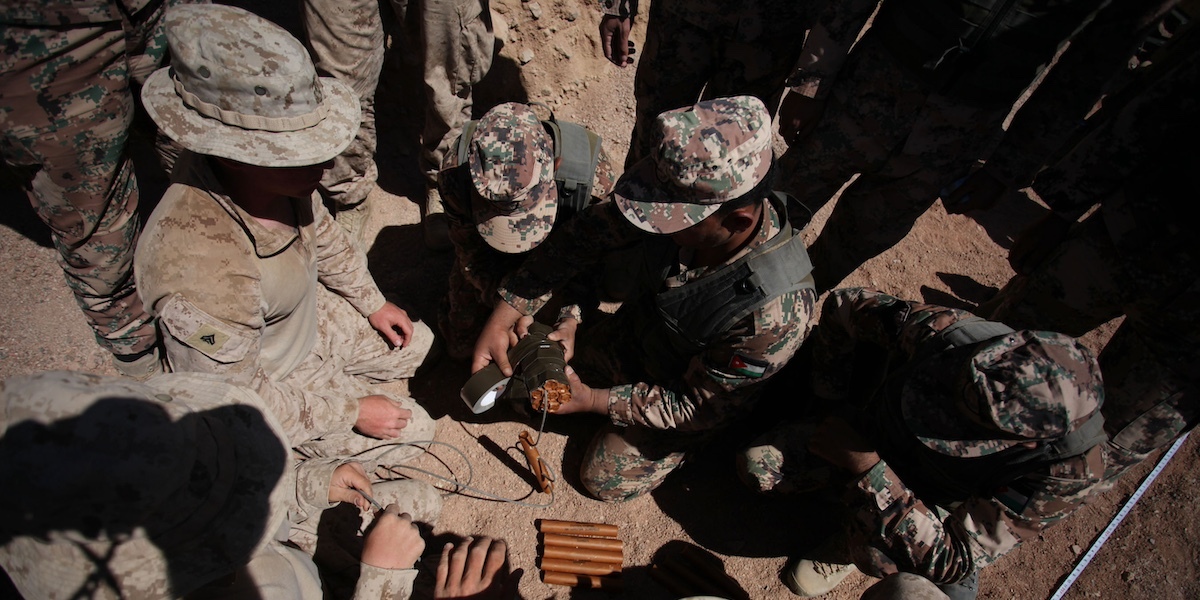Loading player
The United States struck at least 85 targets in seven locations across Syria and Iraq on Friday evening. They were operational bases, intelligence centers and weapons depots controlled by pro-Iranian militias or used directly by the Revolutionary Guards, the country’s most important military force. It was not an unexpected operation, on the contrary: the United States had announced its intention to undertake a military operation in the Middle East already on Wednesday, and on Thursday it had released further details.
The attacks add to the tensions that have shaken the situation throughout the Middle East in recent weeks and which are involving the United States, Iran and its affiliated militias, but also Israel and Hamas, who have been clashing and they fight in the Gaza Strip.
The situation the United States finds itself in it’s not easy: on the one hand they must react in some way to the continuous attacks against their military bases in the Middle East, but on the other they must be careful to balance the responses so that they are strong enough to function as a deterrent against future military operations, but not so much aggressive enough to force Iran to respond and risk the start of another war in the region.
The bombings in Syria and Iraq were the first part of the US response to the attack on a military base in Jordan on Sunday, in which three soldiers were killed. It was the latest in a series of more than 150 attacks carried out in recent months against US military infrastructure in the Middle East. Responsibility has been attributed or claimed by pro-Iranian militias, i.e. armed paramilitary groups financed and supported by Iran: they are known as the “resistance front” or the “axis of resistance”, where the resistance is to be understood against Israel and the United States, Iran’s two historic enemies.
– Read also: What is known about the attack on the US base in Jordan
Some of these militias are particularly large or important: one example is Hezbollah, which controls southern Lebanon and is at the same time a Shiite Islamist political party, an extremely powerful paramilitary organization and a radical group that has committed several attacks in the past decades terrorists. The Houthi rebels are also affiliated with Iran and in recent weeks have attacked various ships transiting the Red Sea, creating problems for global trade and provoking several military responses from a coalition led by the United States: the latest on the 3rd February, when a US-UK-led coalition struck 36 targets at various sites in northern Yemen, territory largely controlled by the Houthis.
Sunday’s attack on the base in Jordan was also claimed by an Iranian-funded militia called the Islamic Resistance based in Iraq.
– Read also: The word “rebels” is now close to the Houthis
The United States waited almost a week to respond to Sunday’s attack in Jordan, according to many analysts it was a well thought out choice, done mainly to allow Iran to withdraw its personnel from the bases that would have been hit. According to several anonymous defense sources, CITED from various international newspapers, the United States would in fact have warned Iran of their intentions. Some Defense Department officials justified the wait by saying that Friday was the day with the best weather conditions, which allowed military targets to be perfectly identified and civilian casualties to be avoided.
Furthermore, the United States struck many targets in Iraq and Syria, but not on Iranian soil, a decision that would most likely have provoked a further reaction from the country.
Some Republican politicians have criticized the response of the Democratic Biden administration as too slow and unconvincing. Mike Johnson, the speaker of the House (a sort of president of the chamber) and a very conservative Republican, he spread a statement in which he argues that the government’s strategy is not strong enough: “It’s time for President Biden to recognize that his actions to stop Iran are not working,” he wrote. Tom Cotton, a conservative senator from Arkansas, he defined The Biden administration’s response is “anemic”.
My statement regarding the U.S. strikes in Syria and Iraq. pic.twitter.com/ILO93cf0kS
— Speaker Mike Johnson (@SpeakerJohnson) February 3, 2024
As pointed out by an analysis of the magazine Foreign Policy, Iran is aware that its military capabilities are inferior to those of the United States, and therefore it would have no interest in starting a direct war with the United States. For now it appears that even pro-Iranian militias, which have always considered the United States as their main enemies, are intentionally limiting the scope of their attacks.
Meanwhile, the United States is also fighting Iran through an indirect tool, but used very frequently in recent years: sanctions. Shortly before attacking bases in Syria and Iraq, the Biden administration had sanctioned some companies linked to Iran and involved in the production of drones and missiles, as well as six Revolutionary Guards officers considered responsible for cyber attacks against the states’ water infrastructure United.
Furthermore, the US government has long accused Iran of exploiting profits from the sale of oil to finance terrorism. The Justice Department on Friday he accused nine people of Iranian, Turkish, Chinese and Omani nationality of being involved in various operations to finance terrorist organizations through the sale of Iranian oil products. The government also has confiscated more than 500 thousand barrels of Iranian oil involved in illicit operations aimed at financing paramilitary forces.
It is therefore a particularly complex scenario that involves the interests of many countries in an area, the Middle East, which has been particularly unstable for some time. It is likely that following the US attacks on Friday, pro-Iranian militias will decide to limit their operations against US bases in the Middle East, without stopping them completely.
